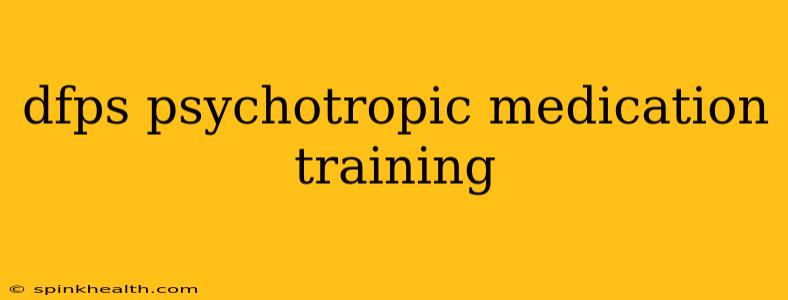The Texas Department of Family and Protective Services (DFPS) plays a crucial role in the lives of children and families, often involving complex cases requiring a deep understanding of mental health. One key aspect of this work involves understanding and managing the use of psychotropic medications among children in the care of the state. This comprehensive guide explores DFPS psychotropic medication training, its importance, and the key aspects professionals need to know.
What is DFPS Psychotropic Medication Training?
DFPS psychotropic medication training equips professionals working within the child protective services system with the knowledge and skills necessary to navigate the complexities of medication management for children in their care. This training isn't just about understanding the medications themselves; it encompasses a broad understanding of child mental health, ethical considerations, legal ramifications, and effective collaboration with medical professionals. Think of it as a vital bridge connecting child welfare and mental healthcare. It's a journey into the intricacies of ensuring children receive appropriate care, balanced with the necessary safeguards and oversight.
Imagine a scenario: A child in DFPS care exhibits severe behavioral challenges that significantly impact their safety and well-being. A psychiatrist recommends psychotropic medication. DFPS professionals trained in this area can effectively assess the situation, understand the rationale behind the medication, monitor its effectiveness, and ensure the child's overall well-being. Without this training, navigating such complexities becomes significantly more challenging.
Why is DFPS Psychotropic Medication Training Important?
The importance of DFPS psychotropic medication training cannot be overstated. It's pivotal for:
- Child Safety and Well-being: Proper medication management can significantly improve a child's behavior, reduce self-harm, and enhance their ability to thrive in a stable environment.
- Informed Decision-Making: Training empowers professionals to make informed decisions regarding medication, considering the child's individual needs, potential side effects, and long-term implications.
- Collaboration with Medical Professionals: Effective communication and collaboration with psychiatrists and other healthcare professionals are essential. This training fosters better teamwork, leading to better outcomes.
- Legal Compliance and Ethical Considerations: DFPS professionals must adhere to strict legal guidelines and ethical standards when managing psychotropic medication for children in their care. Training helps them understand and uphold these standards.
- Improved Case Outcomes: Children receiving appropriate and monitored medication are more likely to experience positive changes in their behavior and overall well-being. This ultimately leads to more successful case outcomes and a pathway toward reunification or placement in a stable, nurturing environment.
What Topics are Covered in DFPS Psychotropic Medication Training?
The curriculum for DFPS psychotropic medication training is comprehensive and multifaceted. Expect to learn about:
- Types of Psychotropic Medications: A thorough overview of different medication classes, their uses, potential side effects, and interactions.
- Assessment and Diagnosis: Understanding the process of assessing a child's mental health needs and the diagnostic criteria for various conditions.
- Medication Monitoring and Side Effect Management: Learning to recognize and address potential side effects, ensuring the child's safety and well-being.
- Legal and Ethical Considerations: Navigating the complex legal landscape surrounding medication for children in the care of the state, ensuring adherence to regulations and ethical guidelines.
- Collaboration with Medical Professionals: Building strong working relationships with psychiatrists and other healthcare professionals, fostering effective communication and shared decision-making.
- Documentation and Reporting: Maintaining accurate and comprehensive records, ensuring transparency and accountability.
Who Needs DFPS Psychotropic Medication Training?
This training is crucial for a wide range of professionals working within the DFPS system, including:
- Caseworkers: Directly involved in the day-to-day care and oversight of children in DFPS care.
- Supervisors: Responsible for overseeing caseworkers and ensuring adherence to policies and procedures.
- Medical Staff: Working directly with children in DFPS care, providing assessment and treatment.
How Can I Access DFPS Psychotropic Medication Training?
The specific details regarding access to DFPS psychotropic medication training would be best obtained directly from the DFPS website or by contacting their training department. They can provide you with the most current and accurate information regarding training availability, eligibility, and scheduling.
This information is for educational purposes only and does not constitute medical or legal advice. Always consult with qualified professionals for any questions or concerns regarding specific cases.

